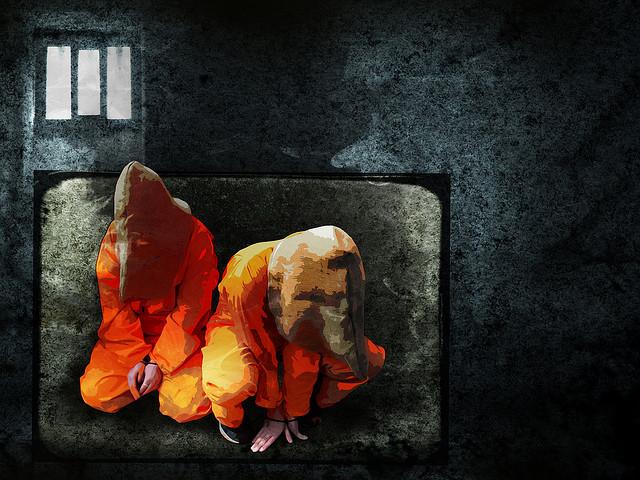
This week’s top story has been the detailed report dissecting the CIA’s justification of its ‘enhanced interrogation’ program. For a quick rundown, see this New York Times piece summarising the report’s findings on the major cases like the bin Laden raid where the CIA claimed torture provided actionable intelligence. (For an even snappier summary, see ‘7 key points from the CIA torture report’.)
For information on the CIA’s practices, Mother Jones rounds up some of the report findings on threats against detainees’ children, detention conditions and torture techniques.
Interrogations saved lives, write ex-CIA directors George Tenet, Porter Goss and Michael Hayden as well as their former deputies in the Wall Street Journal. Challenging the report’s findings, the authors admit the program was imperfect but justify its value in terms of the information received. Keep reading their case here. Meanwhile, in a throwback to 2011, Glenn Greenwald and David Frum debate on bloggingheads.tv torture and prosecution during the Bush administration.
The end of 2014 is fast approaching. Test yourself on the facts of this year’s major world event with this Carnegie Endowment quiz. For some analysis on what to expect in global security in 2015, see this piece by Carnegie experts on areas like the Middle East, nuclear proliferation, China, Ukraine, the global economy and more.
Turning now to Indonesia, TNI’s chief General Moeldoko and US Army Pacific’s General Vincent Brooks team up for a Military Times piece on furthering military bonds in Southeast Asia. Meanwhile here’s some analysis on Eurasia Review by Hipolitus Yolisandry Ringgi Wangge on the ongoing power struggle between the Indonesian military and police (see here for the latest flare-up), which includes some policy recommendations for President Jokowi. Meanwhile, the government tried to quell the latest police–military tensions by throwing a pop concert for soldiers and police officers in Riau province.
Subnational governments are some of Indian Prime Minister Modi’s new instruments for his country’s diplomacy. Once monopolised by the national government, states are being encouraged to build closer ties with sister states. Read more about India’s burgeoning diplomacy and its economic dividends here.
It’s really not the best week for the US and torture revelations. Brazil’s President Dilma Rousseff, herself a former guerrilla fighter and victim of torture, wept as she read the findings of a Truth Commission investigation into systematic murder, torture and abuse, during the country’s military dictatorship from 1964 to 1985. One hundred and ninety-one people were killed and 243 others ‘disappeared’. According to The Guardian’s coverage, the US and UK ‘were found to have trained Brazilian interrogators in torture techniques.’
On capability, the US Navy has tested a new ship-based laser weapon system aboard the USS Ponce this week. The laser is expected to be used against threats like UAVs, slow-moving helicopters and fast patrol craft. For more on the laser’s development, USNI’s Sam LaGrone has a backgrounder here. Watch the video of the test here.
On Wednesday 17 December the Parliamentary Joint Committee on Intelligence and Security will hold the first of its public hearings for the Inquiry into the Telecommunications (Interception and Access Amendment (Data Retention) Bill 2014. Representatives from the Attorney-General’s Department, ASIO, AFP and the Crime Commission will appear before the committee at 9.10am. Further details here.
Got some extra reading time these holidays? Check out this list of the best texts to read for the strategy enthusiast, recommended by strategists and practitioners and compiled by David Andrews.
Podcast
In this Smart Women, Smart Power podcast, Bonnie Glaser discusses President Xi Jinping’s vision for Asia Pacific security, the meaning of ‘that handshake’ between Xi and Shinzo Abe, her impressions of the PLA behaviour and its leadership, the Hong Kong protests and how she became interested in studying China (33mins).
Video
VICE News interviews a former Air Force psychologist, James Mitchell, alleged to be the ‘architect’ of the CIA’s interrogation program. Although reluctant to answer some questions like whether he personally waterboarded Khalid Sheikh Mohamad, he discusses why he believed ‘enhanced interrogation’ would work (25mins).
Natalie Sambhi is an analyst at ASPI and managing editor of The Strategist. Image courtesy of Flickr user Truthout.org.